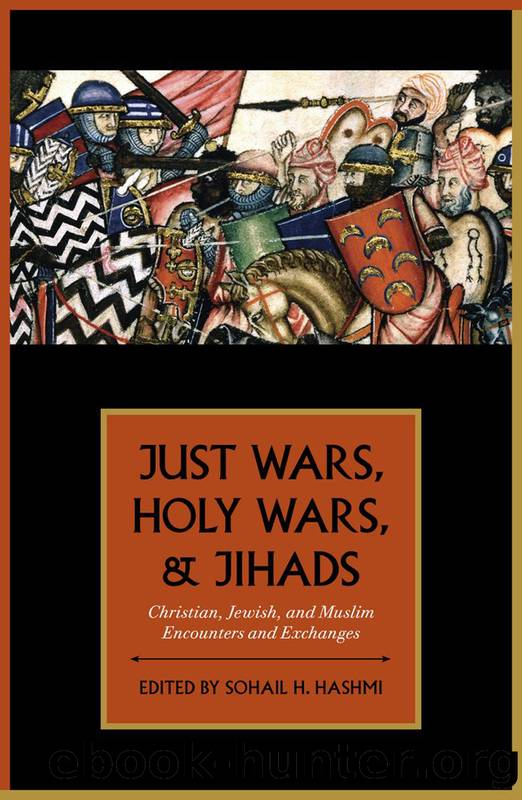Just Wars, Holy Wars, and Jihads by Hashmi Sohail H.;

Author:Hashmi, Sohail H.;
Language: eng
Format: epub
Publisher: Oxford University Press, Incorporated
Published: 2012-07-14T16:00:00+00:00
PART FOUR
EUROPEAN IMPERIALISM
Upon landing in Alexandria, Egypt, on July 1, 1798, Napoleon Bonaparte issued a proclamation to the Egyptian people that began by justifying the invasion: “For a long time [the Mamluks] who lorded it over Egypt have treated the French community basely and contemptuously and have persecuted its merchants with all manner of extortion and violence. Therefore the hour of punishment has now come.” The proclamation went on to preempt a hostile Egyptian response in the name of religion by making the astounding claim: “The French are also faithful Muslims, and in confirmation of this they invaded Rome and destroyed the Papal See, which was always exhorting the Christians to make war with Islam. And then they went to the island of Malta, from where they expelled the Knights, who claimed that God the Exalted required them to fight the Muslims.”1 The ploy failed. An insurrection broke out in Cairo, provoked in part by ulema who declared jihad against the French invaders. Al-Jabarti, the chronicler of these events, makes his low opinion of the revolt’s leaders quite clear: “This deluded one forgot that he was a prisoner in the hands of the French, who occupied the fortress and its walls, the high hills and the low; fortifying them all with forbidding instruments of war; such as cannons on carriages, rifles, carbines, and bombs.”2
As European imperialism spread in Muslim territories during the nineteenth and early twentieth centuries, the French foray into Egypt proved paradigmatic as far as European rationales and Muslim reactions were concerned. The European justifications for imperialism were manifold, but the rhetoric of just war and crusaderism was prominent. The former is evident in the French proclamation cited above. They were defending their national honor and interests. They were punishing the offenders. These rationales would be repeated time and again. The latter was intrinsic to French perceptions of their mission in Egypt and would figure in Napoleon’s subsequent administrative edicts. It was the notion of mission civilisatrice, which manifested itself in many forms over the coming century. This civilizing mission could be viewed as a modern version of crusaderism. Jonathan Riley-Smith divides this phenomenon into “paracrusading” and “pseudocrusading”:
Paracrusading had within it some elements drawn from the old movement, although chosen selectively and distorted. Pseudocrusading had no correspondence to the old reality, but borrowed its rhetoric and imagery to describe ventures—particularly imperialist ones—that had nothing at all to do with the Crusades, as nations already expressing pride in their crusading past became involved in the scramble for empire.3
Neither of these forms of crusaderism had a direct religious motivation, at least not explicitly. In the program of many missionaries, however, crusaderism was a means to open lands for peaceful proselytizing, analogous in some ways to the intention behind the expansionist jihad of classical doctrine. As such, this crusaderism could be said to have had indirect religious motivations.
Many Muslims interpreted European imperialism as a new crusade. The first modern history of the medieval Crusades, Al-Akhbar al-saniyya fi al-hurub al-salibiyya (Splendid Accounts of the Crusades), was published in 1899 by the Egyptian scholar Sayyid ‘Ali al-Hariri.
Download
This site does not store any files on its server. We only index and link to content provided by other sites. Please contact the content providers to delete copyright contents if any and email us, we'll remove relevant links or contents immediately.
| Africa | Americas |
| Arctic & Antarctica | Asia |
| Australia & Oceania | Europe |
| Middle East | Russia |
| United States | World |
| Ancient Civilizations | Military |
| Historical Study & Educational Resources |
German, Jew, Muslim, Gay by Marc David Baer(1002)
Letters to a Young Contrarian by Christopher Hitchens(965)
American Prophets by Jack Jenkins(852)
Unholy by Sarah Posner(729)
Shapiro, Ben - The Right Side of History by Shapiro Ben(695)
M31 by Stephen Wright(664)
The End of Empathy by John W. Compton(641)
Sacred Causes by Michael Burleigh(611)
Jihad & Co. - Black Markets and Islamist Power by Aisha Ahmad(596)
The Theft of America's Soul by Phil Robertson(557)
ERADICATE - Blotting Out God in America by Fiorazo David(556)
Atheist Universe by David Mills(555)
Sacred Liberty by Steven Waldman(531)
The Family by Sharlet Jeff(519)
The Jefferson Bible - Life And Morals Of Jesus Of Nazareth by Thomas Jefferson(502)
Religion and Power by Martin David(494)
C Street by Jeff Sharlet(493)
Beyond Terror: Islam's Slow Erosion of Western Democracy by Anne Marie Waters(493)
Doing Theology in the Age of Trump: A Critical Report on Christian Nationalism (Westar Seminar on God and the Human Future Book 0) by Robbins Jeffrey W(483)
